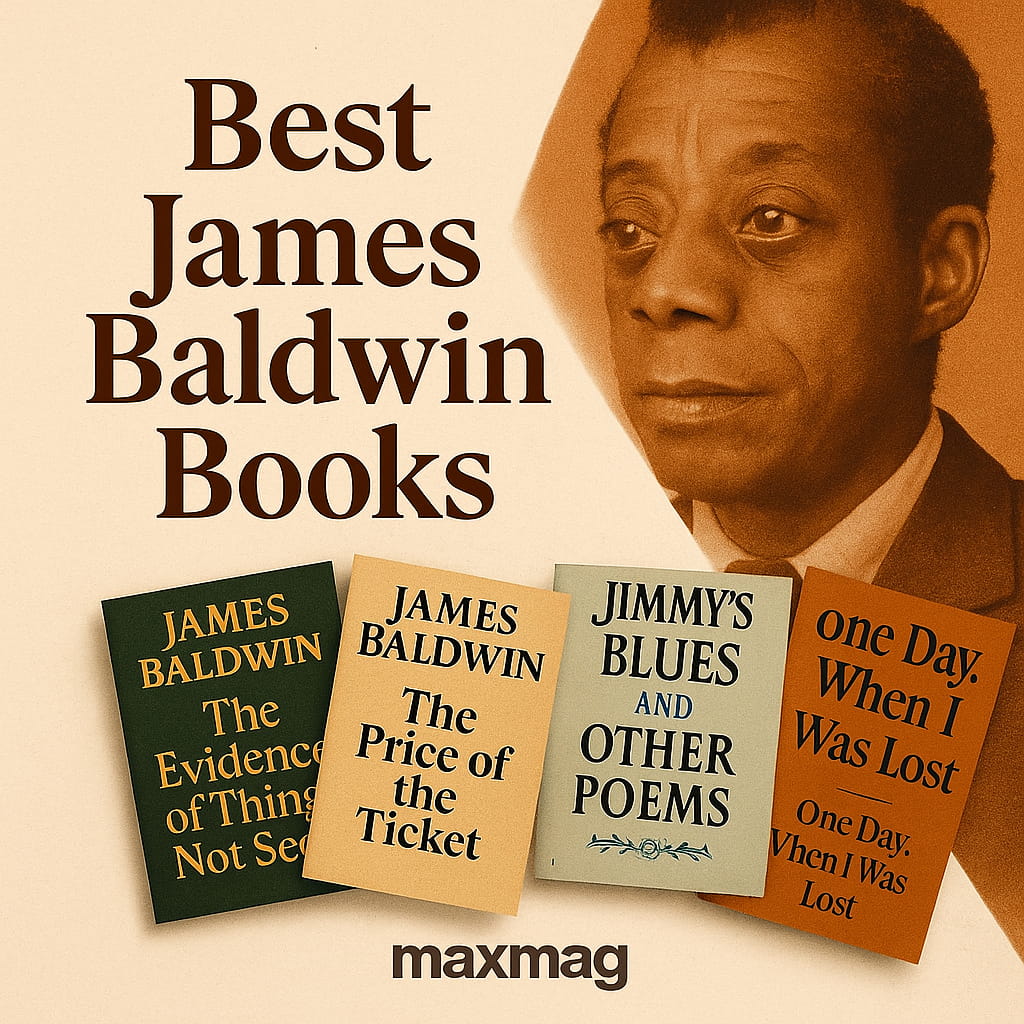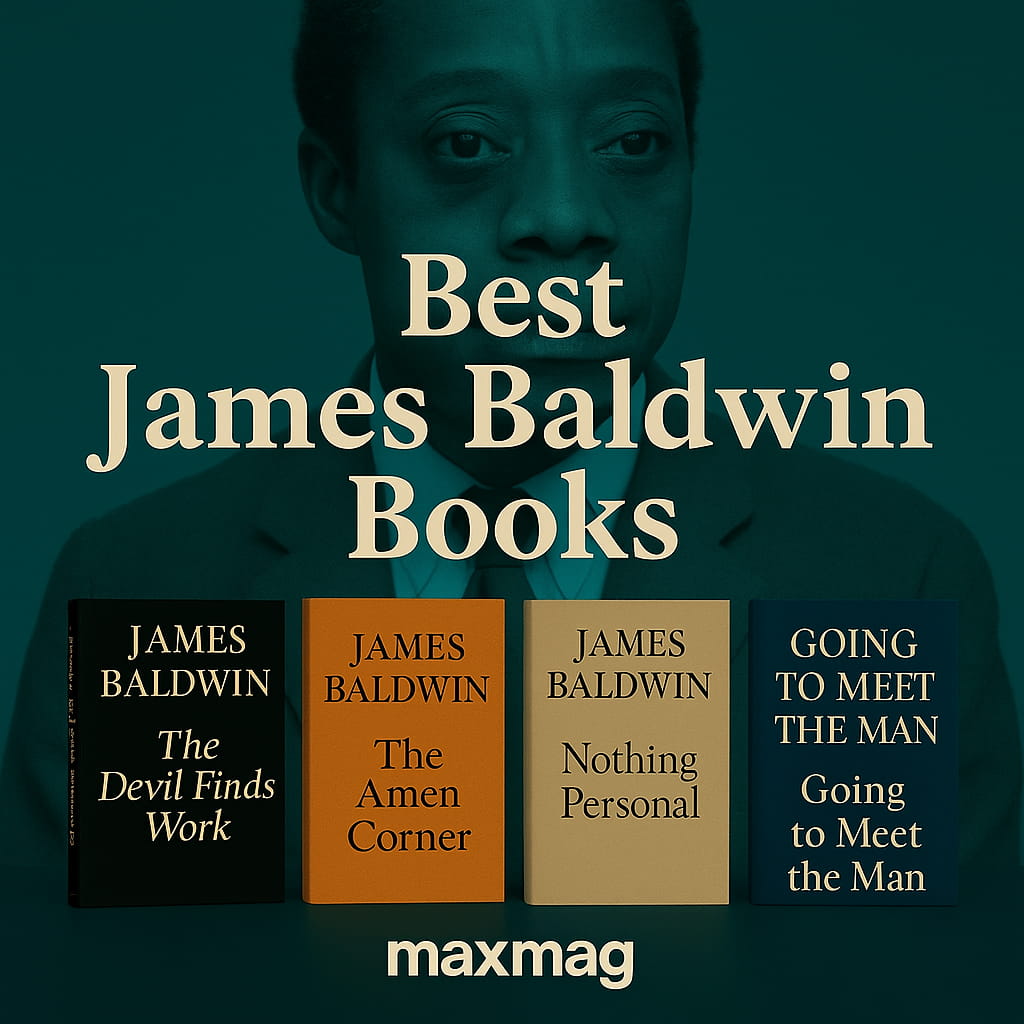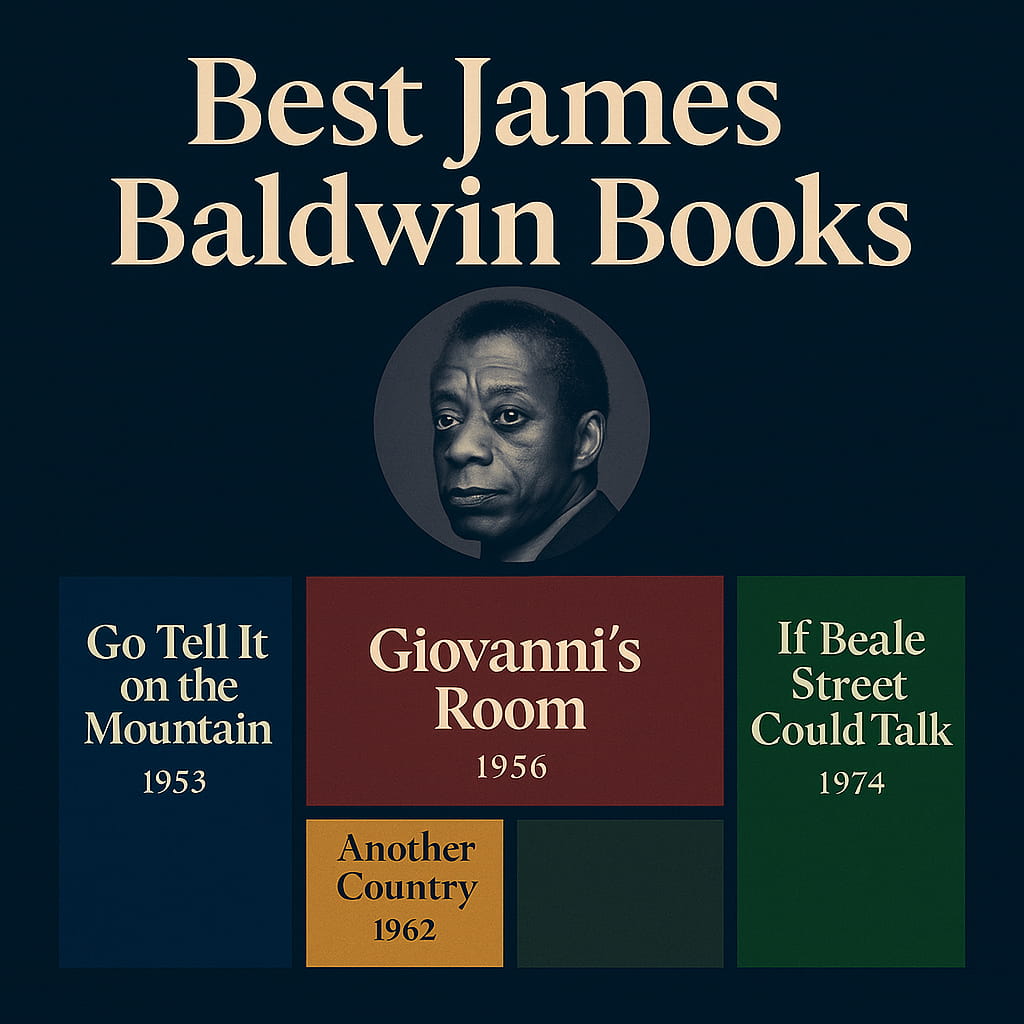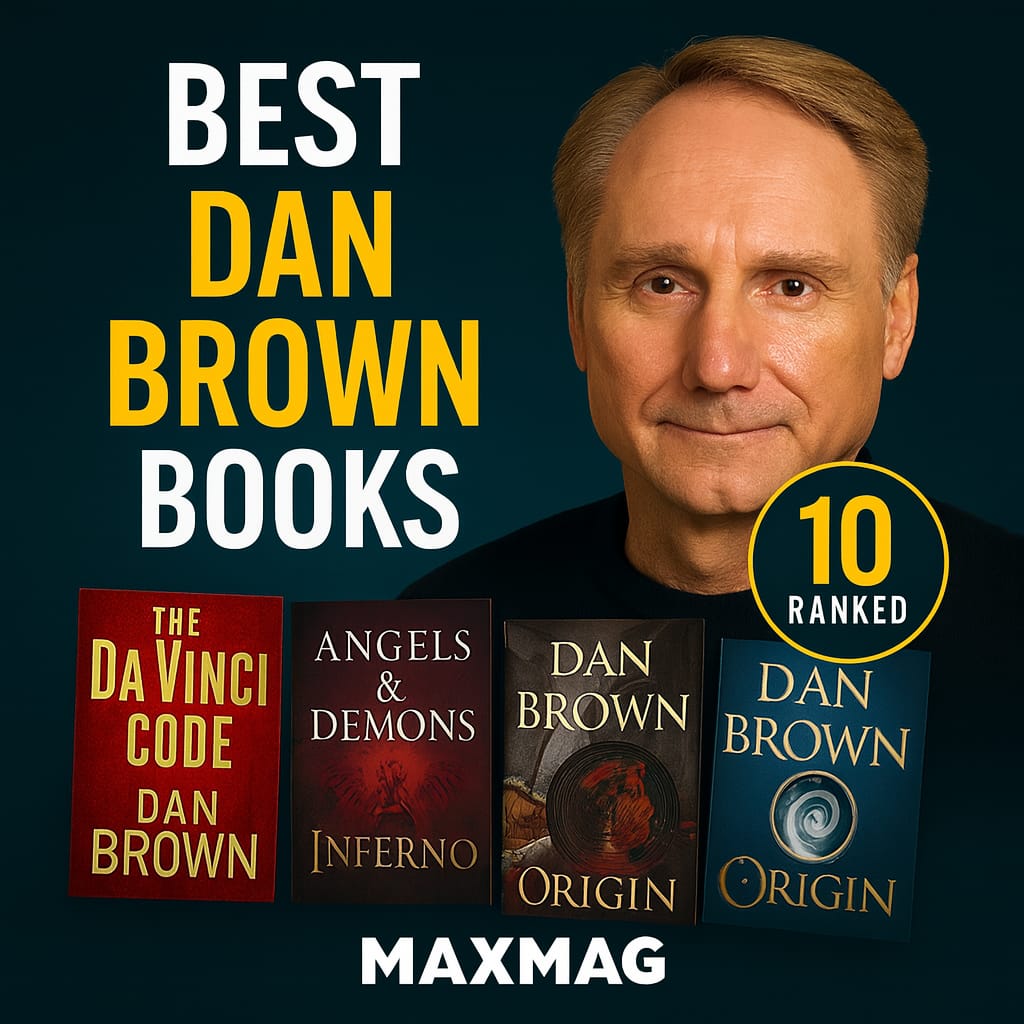
James Arthur Baldwin shaped American letters; the Best James Baldwin Books document a career that crossed borders. Born in Harlem in 1924, he wrote novels, essays, plays, poems, and reportage. He moved between New York and Paris, and later across Europe and the American South. Landmark titles include Go Tell It on the Mountain and Giovanni’s Room. His early preaching years and his expatriate life sharpened his subjects. He tracked faith, desire, race, class, and exile with steady attention. Across four decades, he recorded a country talking to itself.
His breakthrough as a public voice arrived with The Fire Next Time, and classroom staples also include Notes of a Native Son and Giovanni’s Room. Across these shelves, readers meet recurring motifs of family, faith, and responsibility, which is why guides to the Best James Baldwin Books remain in demand. This ranked report covers 23 books spanning 1953–2017. It is a ratings-led climb from deep cuts to consensus classics, organized by reader scores with a ≥3.0/5 threshold. Ties fall to earlier year, then A–Z title. Entries summarize plots in eight sentences, with sources checked on October 17, 2025.
23 Best James Baldwin Books in a Rising Rating Order
Methodology & Updates
Sources: Goodreads title and author pages captured October 17, 2025; positions reflect average reader ratings (ties by earlier year, then A–Z). Because ratings can shift, placements may change in later updates to the Best James Baldwin Books.
#1) The Amen Corner – 1954
- Author: James Baldwin
- Published: 1954
- Work Type / Genre Tags: play, family drama, faith
- Themes: religion, hypocrisy, motherhood, music, community
- Goodreads Rating: 3.95/5
Set in a Harlem storefront church, Pastor Margaret Alexander leads a fervent congregation while her son David longs for a life in music. A sudden return by her estranged husband fractures the uneasy peace. Margaret must decide whether to protect her authority or face her past. The family’s private wounds ripple through the pews and choir loft. Revelations about illness and abandonment complicate loyalties. Accusations rise from pulpit to floor, forcing a reckoning. A public crisis tests Margaret’s calling and her son’s future. The finale lands on a choice about love, vocation, and release.
#2) Go Tell It on the Mountain – 1953
- Author: James Baldwin
- Published: 1953
- Work Type / Genre Tags: novel, bildungsroman
- Themes: salvation, sin, fathers and sons, identity
- Goodreads Rating: 4.05/5
Harlem in the 1930s frames fourteen-year-old John Grimes and his Pentecostal family. A birthday triggers a church tarrying service and a confrontation with inherited sin. John seeks a path beyond his stepfather Gabriel’s harsh faith. Flashbacks chart Gabriel’s secrets and the family’s migrations. Household tensions mount as prayer turns ecstatic. John’s visions merge memory and scripture in a mounting trance. He grasps the cost of forgiveness without naming its terms. Dawn finds him altered, with a future still contested.
#3) A Rap on Race – 1971
- Author: James Baldwin
- Published: 1971
- Work Type / Genre Tags: dialogue, nonfiction
- Themes: race, culture, power, language
- Goodreads Rating: 4.05/5
In New York, Baldwin and anthropologist Margaret Mead sit down for extended, recorded conversations. They open with definitions and personal stakes in naming race and power. Baldwin presses lived experience; Mead tests frameworks. The exchange turns to history, empire, and American myths. Stories surface about education, policing, and intimacy across color lines. Arguments sharpen, then pivot, then return to first principles. A shared demand for clarity drives toward provisional agreements. The talk ends with an insistence on action rooted in truth.
#4) The Evidence of Things Not Seen – 1985
- Author: James Baldwin
- Published: 1985
- Work Type / Genre Tags: reportage, true crime, essay
- Themes: justice, fear, institutions, memory
- Goodreads Rating: 4.06/5
Atlanta at the turn of the 1980s becomes the locus for Baldwin’s inquiry into a string of child murders. He begins with neighborhoods, families, and the rhythms of daily life. The investigation’s official storyline collides with residents’ testimony. Baldwin tracks prosecutors’ claims and the press’s angles. Historical patterns of racial control shadow each scene. New facts and contradictions complicate the presumed narrative. The closing pages widen the frame to American accountability. The book ends by asking what kind of safety a nation really offers.
#5) One Day, When I Was Lost: A Scenario – 1972
- Author: James Baldwin
- Published: 1972
- Work Type / Genre Tags: screenplay, biographical
- Themes: transformation, faith, politics, voice
- Goodreads Rating: 4.07/5
Structured as cinematic sequences, the script follows Malcolm Little’s emergence as Malcolm X. Early scenes sketch Lansing, Boston, and Harlem hustles. Prison becomes the crucible for new belief and discipline. Relationships with mentors and family steer the arc. Nation of Islam chapters build, rupture, and reset the course. Speeches and camera moves foreshadow a broader pilgrimage. A climactic itinerary points toward self-definition beyond faction. The scenario closes with the public consequences of a private evolution.
#6) Blues for Mister Charlie – 1964
- Author: James Baldwin
- Published: 1964
- Work Type / Genre Tags: play, courtroom drama
- Themes: violence, complicity, memory, justice
- Goodreads Rating: 4.16/5
In a small Southern town, a young Black musician is killed and a white shopkeeper stands accused. Church, family, and press gather as testimony takes shape. The victim’s friends seek clarity in a fog of fear. Past grudges and private bargains surface on the stand. Witnesses contradict one another and themselves. The trial’s choreography reveals who is protected and why. A verdict lands with the weight of custom. The community must live with what it has declared.
#7) Little Man, Little Man: A Story of Childhood – 1976
- Author: James Baldwin
- Published: 1976
- Work Type / Genre Tags: children’s fiction
- Themes: friendship, neighborhood, safety, pride
- Goodreads Rating: 4.21/5
Harlem streets and stoops become a four-year-old’s world in a single day of errands and games. TJ and his friends meet shopkeepers, neighbors, and watchful adults. The boy wants to be brave and useful in a big city. Misunderstandings and scrapes teach quick lessons. Music, basketball, and porch talk map belonging. A minor crisis tests trust between kids and guardians. Evening brings stories that resolve the day’s frictions. The child falls asleep knowing names, faces, and routes home.
#8) Jimmy’s Blues and Other Poems – 1983
- Author: James Baldwin
- Published: 1983
- Work Type / Genre Tags: poetry
- Themes: love, anger, history, witness
- Goodreads Rating: 4.22/5
Poems move from cities to bedrooms to borders. Opening pieces stake a claim to voice and survivals. Speakers confront the uses of love and language. Names from history appear as living presences. Mid-sequence lyrics knot desire with public grief. Later pieces widen to global movements and migrations. The closing poems settle into hard-won clarity. The final lines keep the door open to tomorrow’s work.
Early Currents in the Best James Baldwin Books

#9) The Devil Finds Work – 1976
- Author: James Baldwin
- Published: 1976
- Work Type / Genre Tags: film criticism, essay
- Themes: Hollywood, myth, race, gaze
- Goodreads Rating: 4.25/5
From childhood matinees to studio screen tests, Baldwin narrates a life watched by movies. An early viewing becomes the hinge for remembering. He tracks a line from plantation fantasies to noir and war film. Friendships and casting rooms show power off-screen. Iconic titles are revisited for what they teach and hide. Personal episodes measure cinema against daily experience. A late return to certain films reframes their promises. The book ends by asking what images demand of a citizen.
#10) If Beale Street Could Talk – 1974
- Author: James Baldwin
- Published: 1974
- Work Type / Genre Tags: novel, romance, legal drama
- Themes: love, injustice, family, hope
- Goodreads Rating: 4.28/5
In 1970s Harlem, nineteen-year-old Tish narrates her love for sculptor Fonny. An arrest on a false charge shatters their plans. Tish, pregnant, vows to hold the line until trial. Two families navigate lawyers, landlords, and loyalties. A witness search widens from basements to far-off rooms. Time compresses around court delays and phone calls. The final chapters push toward a birth and a hearing. The last page leaves a mother and a case in motion.
Later‑Middle Turns of the Best James Baldwin Books
#11) Another Country – 1962
- Author: James Baldwin
- Published: 1962
- Work Type / Genre Tags: novel, ensemble drama
- Themes: desire, art, betrayal, race
- Goodreads Rating: 4.30/5
Greenwich Village and Harlem anchor a circle of artists and lovers. A jazz musician’s breakdown sets events in motion. Friends try to define loyalty after a loss. Cross-racial and bisexual relationships test trust. Work, money, and immigration complicate the map of care. Midway, new pairings form and old ones fray. A late gathering forces candor about grief and need. The end locates endurance in chosen kin.
#12) Tell Me How Long the Train’s Been Gone – 1968
- Author: James Baldwin
- Published: 1968
- Work Type / Genre Tags: novel, Künstlerroman
- Themes: performance, illness, politics, love
- Goodreads Rating: 4.30/5
Actor Leo Proudhammer collapses onstage and revisits the roads that led there. Hospital time triggers scenes from childhood to activism. He wants to keep working and keep faith with his people. Lovers and siblings complicate the ledger of debts. Rehearsal rooms and rallies supply turning points. Career choices grow heavier as movements change. A late audition doubles as a test of will. Exit lines point to survival without certainty.
#13) Giovanni’s Room – 1956
- Author: James Baldwin
- Published: 1956
- Work Type / Genre Tags: novel, expatriate fiction
- Themes: desire, shame, freedom, choice
- Goodreads Rating: 4.34/5
Paris in the 1950s hosts David, an American adrift, and Giovanni, an Italian bartender. An engagement and an affair collide in cramped rooms. David wants a future he can present to the world. Friends and patrons heighten pressures and evasions. Money, work papers, and gossip close in. A legal case raises the story’s stakes. The final part traces departures and denials. The ending leaves a view of loss no one can undo.
#14) Notes of a Native Son – 1955
- Author: James Baldwin
- Published: 1955
- Work Type / Genre Tags: essays
- Themes: family, protest, art, belonging
- Goodreads Rating: 4.36/5
Essays begin with a funeral and a riot in wartime Harlem. Then they move through literature, film, and memory. The author seeks a language equal to experience. Profiles and reviews become maps of a country’s nerves. Encounters in Switzerland and Paris test American habits abroad. Midway, he revisits fathers, faith, and inheritance. Later pieces join personal episodes to public life. The book closes with a demand for honest seeing.
#15) Nobody Knows My Name – 1961
- Author: James Baldwin
- Published: 1961
- Work Type / Genre Tags: essays
- Themes: identity, criticism, journey, speech
- Goodreads Rating: 4.36/5
Returning to the U.S., the writer reports from the South and from uneasy Northern rooms. Letters and lectures test what candor can do. He looks for the difference between safety and silence. Writers and activists appear as foils and companions. Cities show the limits of patience and the need for speech. A mid-book pivot weighs home against exile. Closing pieces gather lessons from hard meetings. The last page turns travel into a method for truth.
#16) Going to Meet the Man – 1965
- Author: James Baldwin
- Published: 1965
- Work Type / Genre Tags: short stories
- Themes: violence, music, kinship, memory
- Goodreads Rating: 4.37/5
Eight stories chart lives from Harlem jazz clubs to Southern jails. An older brother teaches music as a way to breathe. A salesman measures himself by rooms he enters. Sons and fathers argue over fear and promise. A sheriff’s night of insomnia breaks open a past atrocity. Lovers face the cost of their bargains. Children learn what adults try to hide. The final story leaves a town awake to its own history.
Momentum Builds across the Best James Baldwin Books

#17) Just Above My Head – 1979
- Author: James Baldwin
- Published: 1979
- Work Type / Genre Tags: novel, friendship saga, music
- Themes: faith, art, grief, brotherhood
- Goodreads Rating: 4.44/5
Friends Arthur, Julia, and Hall gather around gospel stages and back rooms. A narrator reconstructs their crossings over thirty years. He wants to honor the dead without smoothing their edges. Managers, lovers, and churches complicate the record. Southern tours and European trips shift the stakes. Private losses echo through public songs. A late confession reframes old scenes. The book ends by holding a chorus together on the page.
#18) I Am Not Your Negro – 2017
- Author: James Baldwin
- Published: 2017
- Work Type / Genre Tags: essays/script, documentary companion
- Themes: history, witness, unfinished work
- Goodreads Rating: 4.47/5
Drawn from the unfinished project “Remember This House,” the text assembles notes on Medgar Evers, Malcolm X, and Martin Luther King Jr. Early pages position public murder as a national mirror. Photographs and captions cue shifts in voice and scene. Letters and drafts sketch a book he meant to finish. Quotations return to earlier essays for spine. The film’s chronology offers one route through the fragments. The final sequence insists on looking without flinching. The close leaves the reader among living questions.
#19) No Name in the Street – 1972
- Author: James Baldwin
- Published: 1972
- Work Type / Genre Tags: memoir/essays
- Themes: loss, movement, solidarity, memory
- Goodreads Rating: 4.48/5
After assassinations and trials, Baldwin writes as a witness crossing continents. He opens with funerals and unfinished conversations. Exile and return braid through each chapter. Letters and visits map alliances and estrangements. The record of courtrooms and streets sits beside family kitchens. A mid-book turn considers what breaks and what holds. Late pages argue for saying what one has seen. The last lines refuse forgetting as a form of peace.
#20) The Cross of Redemption: Uncollected Writings – 2010
- Author: James Baldwin
- Published: 2010
- Work Type / Genre Tags: essays, speeches, reviews
- Themes: politics, literature, faith, dissent
- Goodreads Rating: 4.50/5
Pieces rescued from magazines and archives move from art to elections. The opening selection states what criticism is for. Profiles and polemics name the costs of compromise. Sermon-like paragraphs test what courage requires. Notes on Russia, religion, and classrooms widen the lens. Editorials from different decades speak to one another. A closing cluster returns to craft and accountability. The collection ends by handing readers a set of tools.
#21) The Fire Next Time – 1963
- Author: James Baldwin
- Published: 1963
- Work Type / Genre Tags: essays (two long letters)
- Themes: faith, race, nation, responsibility
- Goodreads Rating: 4.55/5
A letter to a nephew sets the book’s frame and stakes. The second essay walks through a church past and a country’s present. The writer seeks what love demands without disguise. Encounters with religious leaders sharpen the argument. New York streets and Southern trips supply the evidence. Paragraph by paragraph, a future is argued for. The final cadence warns, pleads, and promises. The last sentence leaves work for those who read it.
The Crest: Canon within the Best James Baldwin Books
#22) Nothing Personal – 1964
- Author: James Baldwin
- Published: 1964
- Work Type / Genre Tags: photo-essay, social critique
- Themes: isolation, power, image, belonging
- Goodreads Rating: 4.67/5
Short texts pair with stark photographs to make an essay in images. The first pages question what America asks people to become. Studio portraits and street scenes argue in counterpoint. The writer names the costs of spectacle and denial. A mid-sequence turn imagines what saying yes to life requires. Later passages refuse easy consolations. The last spread brings words and faces into uneasy harmony. The book stops with an invitation to look harder.
#23) The Price of the Ticket: Collected Nonfiction, 1948–1985 – 1985
- Author: James Baldwin
- Published: 1985
- Work Type / Genre Tags: collected essays
- Themes: art, democracy, courage, memory
- Goodreads Rating: 4.68/5
Four decades of reportage, reviews, profiles, and speeches appear in one volume. Early pieces chart a young critic finding his range. Mid-career essays test how a sentence can hold a city. Later work records friendships, fights, and reckonings. The sequence shows ideas maturing without softening. Portraits of artists and activists double as self-portraits. A late address turns reading into a civic act. The collection ends with a vocabulary for living in truth.
James Baldwin: Life & Legacy
James Baldwin (1924–1987) grew up in Harlem, apprenticed himself to the pulpit and the page, and became an expatriate who kept writing home; his forms ranged across novels (Go Tell It on the Mountain, Giovanni’s Room, Another Country, If Beale Street Could Talk, Just Above My Head), essays (Notes of a Native Son, Nobody Knows My Name, The Fire Next Time, No Name in the Street, The Devil Finds Work, The Price of the Ticket), plays (The Amen Corner, Blues for Mister Charlie), poetry (Jimmy’s Blues), and reportage (The Evidence of Things Not Seen). His work shaped public argument and influenced generations of writers and teachers, a reach reflected in the Best James Baldwin Books.
Conclusion
This guide gathers 23 works across six decades, showing an arc from apprenticeship to established phases to the pieces now most embraced; for a concise centennial portrait, see the Library of Congress overview (Library of Congress profile).
Across the list, patterns recur—families under pressure, faith under revision, desire at odds with expectation—while form flexes from courtrooms to letters and photo‑essays; for a curated path through his essays and reportage, explore The New Yorker’s archive (James Baldwin at The New Yorker).
FAQ: What to know about the Best James Baldwin Books
Q1: How did you rank the Best James Baldwin Books?
Q2: Where should a new reader begin among the Best James Baldwin Books?
Q3: Do the Best James Baldwin Books include plays and poetry?
Q4: What subjects recur across these books?
Q5: Which titles are most assigned in schools among the Best James Baldwin Books?







